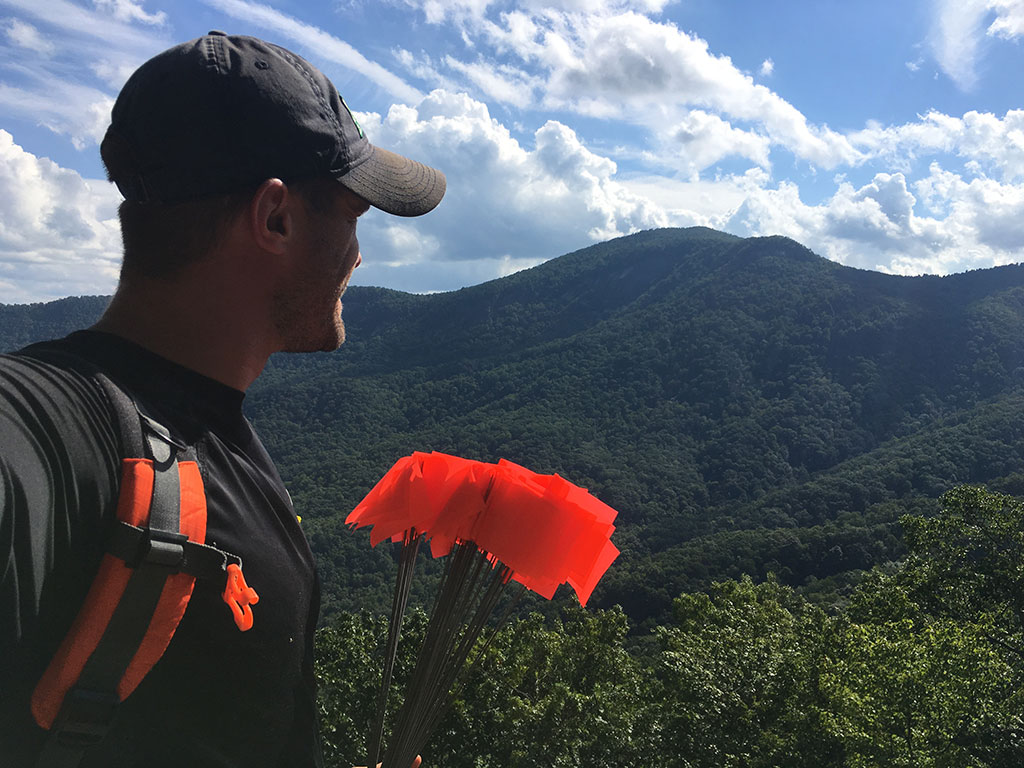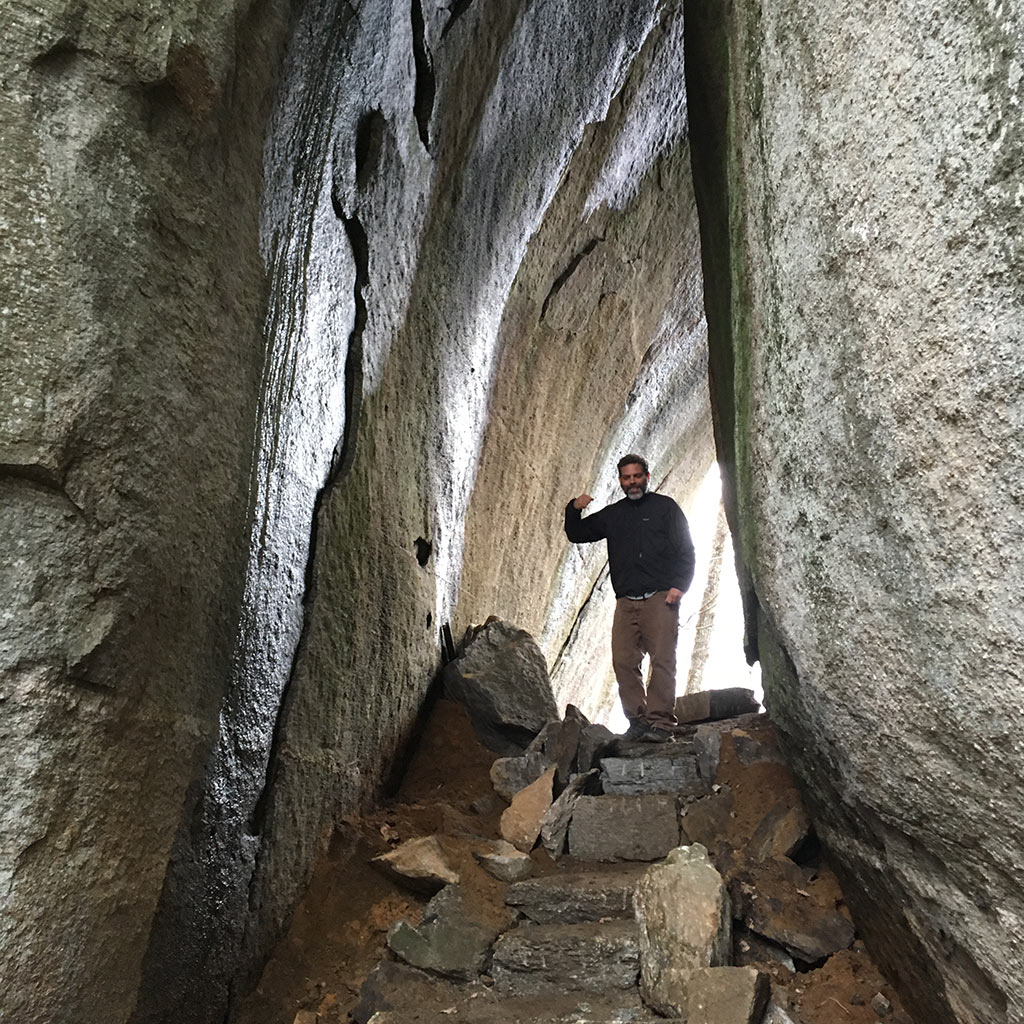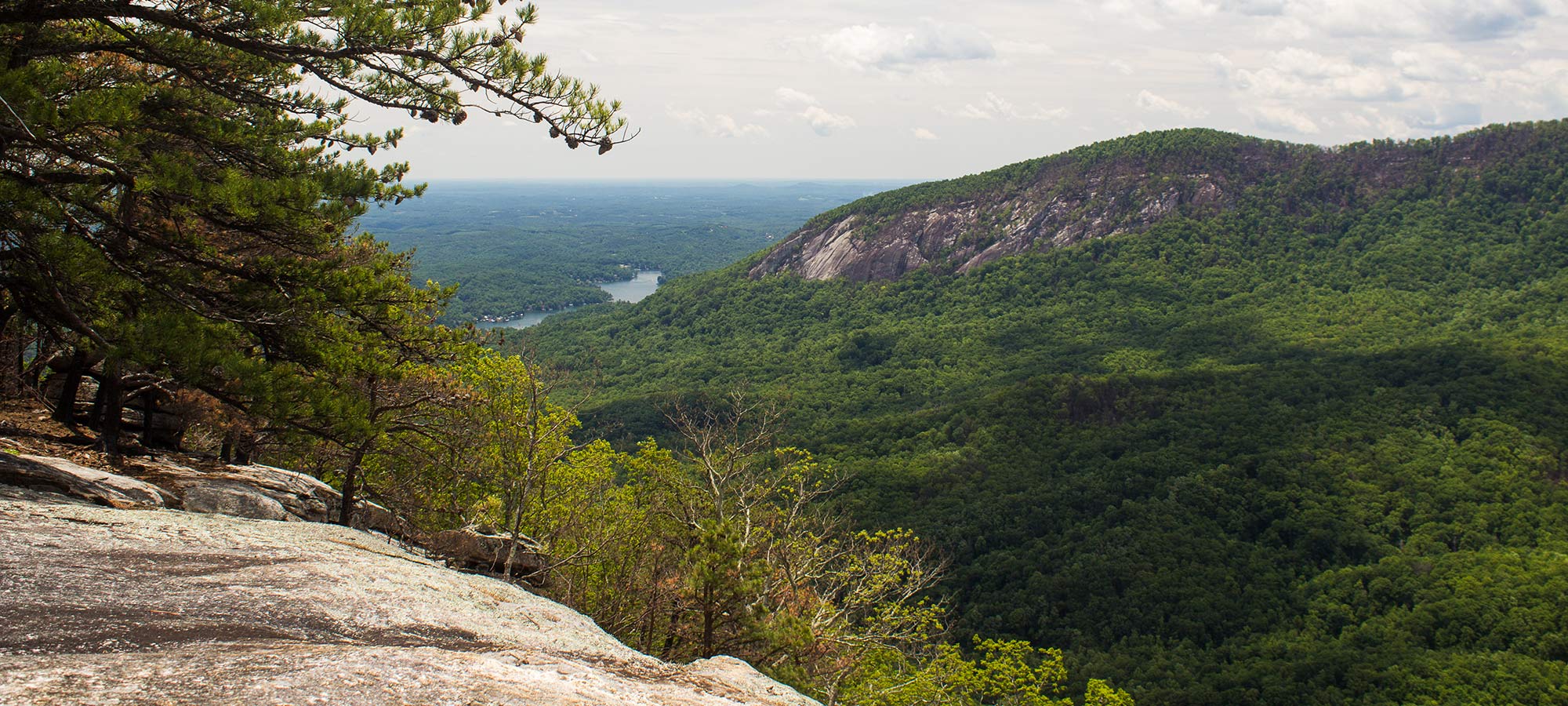Hickory Nut Gorge, which sits 45 minutes east of downtown Asheville, North Carolina is a 14-mile-long canyon known for its granite outcroppings and the placid waters of Lake Lure. A new multiuse trail near Hickory Nut Gorge will give hikers, climbers and mountain bikers access to some of the region’s most dramatic backcountry. Weed Patch Mountain Trail is a brand-new 8.6-mile (one-way) romp through some of Hickory Nut Gorge’s wildest terrain, connecting Buffalo Creek Park, which already has a 3.5-mile mountain bike loop, with Eagle Rock, a climbing crag on the north side of Rumbling Bald Mountain inside Chimney Rock State Park.
“It was designed to be a backcountry hiking trail that can also be biked, so the terrain is extremely rugged and remote,” says Peter Barr, the trails coordinator for Conserving Carolina, the land trust that spearheaded Weed Patch Mountain Trail’s development. “The solitude is the trail’s signature factor. You feel like you’re in the middle of nowhere.”
Weed Patch Mountain provides hikers with the first real backcountry experience in the gorge (backcountry campsites are in the works) while mountain bikers can combine the front country trails at Buffalo Creek Park with Weed Patch to create a 20-mile out-and-back adventure. Riders should expect an advanced trail with extensive rock gardens and optional features like boulder drops and log skinnies. Everyone will enjoy the expansive views from various rock outcroppings along the path.

Peter Barr, trails coordinator for Conserving Carolina, looks out at Eagle Rock. (Photo Credit: Conserving Carolina)
A Weed Patch spur trail also provides the first access to Eagle Rock, an expansive cliff on the north side of Rumbling Bald that offers a mix of climbing, from V0 bouldering to steep multi-pitch trad routes, via a quarter-mile spur trail that passes through a 30-yard-long rock tunnel before reaching the base of the cliff. It’s a significant development for climbers; Rumbling Bald is a granite dome with a lifetime of world-class trad routes and bouldering problems, but most of the development has been concentrated on the south side of the mountain where the state park has developed access and a small trail system. Accesing the north side of the mountain, where Eagle Rock stands, has been tricky for climbers because of private property surrounding the crag. The new trail gives climbers the first legal access to the north side of Rumbing Bald, and Barr hopes it will lead to further climbing access in the area.
“That north side of Rumbling Bald is the holy grail for climbers. There’s so much rock and so much opportunity for new routes, and it’s just now open to the public,” Barr says.
A $5,000 REI grant to Carolina Climbers Coalition (CCC) last year helped fund the construction of the Eagle Rock access trail. The co-op is continuing to support the Eagle Rock area through another $5,000 grant to CCC this year, which would help expand the access trail—creating a sustainable staging area and trail along the base of the climbing area.

The Tunnel Trail, a spur trail off Weed Patch Mountain Trail, provides the first access to Eagle Rock, a climbing area in Chimney Rock State Park. (Photo Credit: Conserving Carolina)
Weed Patch Mountain Trail officially opened May 4 to the public. The land was once slated for development as part of the Grey Rock subdivision, but in 2009 during the recession, Conserving Carolina was able to purchase the property out of bankruptcy, and in 2011 put more than 1,500 acres in a conservation easement. In 2013, the town of Lake Lure completed a 3.5-mile loop for mountain bikers in Buffalo Creek Park. Conserving Carolina has helped preserve more than 12,000 acres of land within the gorge and was integral in the creation of Chimney Rock State Park in 2005.
Perhaps more significant, Weed Patch Mountain Trail is the latest addition to a comprehensive Hickory Nut Gorge State Trail network, which, in 30 years, will offer more than 100 miles of paths encircling Lake Lure while connecting the state park with conservation lands like Bearwallow Mountain, Florence Nature Preserve and Youngs Mountain. There are currently 35 miles of trail built within that system, though the mileage is dispersed through a variety of parks and preserves. The completion of Weed Patch Mountain is the first big step toward realizing trail connectivity within Hickory Nut Gorge.
Editor’s note: Conserving Carolina has been a nonprofit partner of REI since 2010. An REI contribution totaling $67,000 has helped support Conserving Carolina’s efforts over the years.


